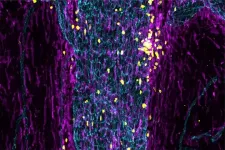Scientists identify individual neurons responsible for complex social reasoning in humans
Neuroscientists had a rare opportunity to observe how individual neurons paint a rich and detailed representation of others' beliefs, including whether they were true or not
2021-01-27
(Press-News.org) BOSTON -- For the first time, scientists have identified the individual neurons critical to human social reasoning, a cognitive process that requires us to acknowledge and predict others' hidden beliefs and thoughts. A team of neuroscientists at Massachusetts General Hospital (MGH) and Massachusetts Institute of Technology (MIT) had a rare look at how individual neurons represent the beliefs of others by recording neuron activity in patients undergoing neurosurgery to alleviate symptoms of motor disorders such as Parkinson's disease. Their findings are published in Nature.
The researchers were studying a very complex social cognitive process called "theory of mind." "When we interact, we must be able to form predictions about another person's unstated intentions and thoughts," says MGH neurosurgeon and the paper's senior author Ziv Williams, MD. "This ability requires us to paint a mental picture of someone's beliefs, which involves acknowledging that those beliefs may be different from our own and assessing whether they are true or false." A simple example of theory of mind: A friend appears to be sad on her birthday. I may infer she is sad because she didn't get a present or she is upset at growing older.
This social reasoning process develops during early childhood and is fundamental to successful social behavior. Individuals with autism, schizophrenia, bipolar affective disorder, and traumatic brain injuries are believed to have a deficit of theory-of-mind ability.
Previous research on the cognitive processes that underlie theory of mind has involved functional MRI studies, where scientists watch which parts of the brain are active as volunteers perform cognitive tasks. But the imaging studies capture the activity of many thousands of neurons. In contrast, Williams and his colleagues recorded the computations of individual neurons - a standard preparatory step for neurosurgery, but put to a new purpose: to provide a detailed picture of how neurons encode social information. "Individual neurons, even within a small area of the brain, are doing very different things, not all of which are involved in social reasoning," says Williams. "Without delving into the computations of single cells, it's very hard to build an understanding of the complex cognitive processes underlying human social behavior and how they go awry in mental disorders."
For the study, 15 patients agreed to perform brief behavioral tasks before undergoing neurosurgery for placement of deep brain stimulation for motor disorders. Micro-electrodes inserted in the dorsomedial prefrontal cortex recorded the behavior of individual neurons as patients listened to short narratives and answered questions about them. For example, participants were presented with this scenario to evaluate how they considered another's beliefs of reality: "You and Tom see a jar on the table. After Tom leaves, you move the jar to a cabinet. Where does Tom believe the jar to be?" The participants had to make inferences about another's beliefs after hearing each story. The experiment did not change the planned surgical approach or alter clinical care.
"Our study provides evidence to support theory of mind by individual neurons," says neuroscientist and the paper's first author Mohsen Jamali, MD, PhD. "Until now, it wasn't clear whether or how neurons were able to perform these social cognitive computations." The investigators found that some neurons are specialized and will only respond when assessing another's belief to be false, for example. Other neurons encode information to distinguish your beliefs from another's. Still other neurons create a representation of a specific item, such as a cup or food item, mentioned in the story. Some neurons may multitask and aren't dedicated solely to social reasoning. "Each neuron is encoding different bits of information," says Jamali. "By combining the computations of all the neurons, you get a very detailed representation of the contents of another's beliefs and an accurate prediction of whether they are true or false."
Now that scientists understand the basic cellular mechanism that underlies human theory of mind, they have an operational framework by which to begin investigating disorders in which social behavior is affected, adds Williams. "Understanding social reasoning is also important to many different fields, such as child development, economics and sociology, and could help in the development of more effective treatments for conditions such as autism spectrum disorder," he says.
INFORMATION:
Funding for this study was provided by the National Institutes of Health, the Brain and Behavior Research Foundation and Harvard University's Foundations of Human Behavior Initiative.
Jamali is an instructor in Neurosurgery at Harvard Medical School (HMS). Williams is associate professor in Neurosurgery at HMS and faculty at the Harvard Medical School Program in Neuroscience. Benjamin Grannan, MD, is a neurosurgery resident at MGH. Evelina Fedorenko, PhD, is an associate professor of Brain and Cognitive Sciences at MIT. Rebecca Saxe, PhD, is professor of Brain and Cognitive Sciences at MIT. Raymundo Baez-Mendoza, PhD, is an instructor in Neurosurgery at HMS.
About the Massachusetts General Hospital
Massachusetts General Hospital, founded in 1811, is the original and largest teaching hospital of Harvard Medical School. The Mass General Research Institute conducts the largest hospital-based research program in the nation, with annual research operations of more than $1 billion and comprises more than 9,500 researchers working across more than 30 institutes, centers and departments. In August 2020, Mass General was named #6 in the U.S. News & World Report list of "America's Best Hospitals."
ELSE PRESS RELEASES FROM THIS DATE:
2021-01-27
What The Study Did: This study among patients in Italy suggests that despite virological recovery, a sizable proportion of patients with COVID-19 experienced respiratory, functional or psychological conditions months after hospital discharge.
Authors: Mattia Bellan, M.D., Ph.D., of Università del Piemonte Orientale in Novara, Italy, is the corresponding author.
To access the embargoed study: Visit our For The Media website at this link https://media.jamanetwork.com/
(doi:10.1001/jamanetworkopen.2020.36142)
Editor's ...
2021-01-27
What The Study Did: In this observational study of about 7,300 adults with laboratory-confirmed COVID-19 in a New York health system, a schizophrenia spectrum diagnosis was associated with an increased risk of death after adjusting for demographic and medical risk factors. Mood and anxiety disorders weren't associated with increased risk of mortality.
Authors: Donald C. Goff, M.D., of New York University Langone Medical Center in New York, is the corresponding author.
To access the embargoed study: Visit our For The Media website at this link https://media.jamanetwork.com/
(doi:10.1001/jamapsychiatry.2020.4442)
Editor's Note: The article includes conflict of interest disclosures. Please see ...
2021-01-27
What The Study Did: Researchers evaluated the association between the pandemic and clinical research and development by studying the initiation of oncology clinical trials over time.
Authors: Elizabeth B. Lamont, M.D., M.S., M.MSc., of Acorn AI by Medidata, a Dassault Systèmes Company, in Boston, is the corresponding author.
To access the embargoed study: Visit our For The Media website at this link https://media.jamanetwork.com/
(doi:10.1001/jamanetworkopen.2020.36353)
Editor's Note: The article includes conflict of interest disclosures. Please see the article for additional information, including other authors, author contributions and affiliations, conflict of interest and financial ...
2021-01-27
New findings on the brain and inner ear cavity of a 400-million-year-old platypus-like fish cast light on the evolution of modern jawed vertebrates, according to a study led by Dr. ZHU Youan and Dr. LU Jing from the Institute of Vertebrate Paleontology and Paleoanthropology (IVPP) of the Chinese Academy of Sciences.
The study was published in Current Biology on Jan 27.
Back in 1960s, Paleontologist Dr. Gavin C. Young found several fossils of a long-beaked fish, a type of placoderm, in the Burrinjuck limestones in Australia. He named the fish Brindabellaspis stensioi, and other people jokingly dubbed it "platypus fish" because of its long ...
2021-01-27
Alzheimer's disease, multiple sclerosis, autism, schizophrenia and many other neurological and psychiatric conditions have been linked to inflammation in the brain. There's growing evidence that immune cells and molecules play a key role in normal brain development and function as well. But at the core of the burgeoning field of neuroimmunology lies a mystery: How does the immune system even know what's happening in the brain? Generations of students have been taught that the brain is immunoprivileged, meaning the immune system largely steers clear of it.
Now, researchers at Washington University School of Medicine in St. Louis believe they have figured out how the immune system keeps tabs on what's going on in the brain. Immune ...
2021-01-27
What makes cancer cells different from ordinary cells in our bodies? Can these differences be used to strike at them and paralyze their activity? This basic question has bothered cancer researchers since the mid-19th century. The search for unique characteristics of cancer cells is a building block of modern cancer research. A new study led by researchers from Tel Aviv University shows, for the first time, how an abnormal number of chromosomes (aneuploidy) -- a unique characteristic of cancer cells that researchers have known about for decades -- could become a weak ...
2021-01-27
Biologists believe they are one step closer to a long-held goal of making a cheap, widely available plant a source for energy and fuel, meaning one of the next big weapons in the battle against climate change may be able to trace its roots to the side of a Texas highway.
Researchers at The University of Texas at Austin, HudsonAlpha Institute for Biotechnology, the U.S. Department of Energy (DOE) and other institutions have published a complex genome analysis of switchgrass, a promising biofuel crop.
The team tied different genes to better performance in varying climates across North America, which now gives scientists a road map for breeding ...
2021-01-27
A high proportion of survivors of Ebola experienced a resurgence in antibody levels nearly a year after recovery, a new University of Liverpool study has found.
Published today in Nature, the finding hints that hidden reservoirs of virus could exist long after symptoms ease and has implications for monitoring programmes and vaccine strategies.
When a person is infected with Ebola virus, their body produces antibodies to fight the disease. Antibody concentrations peak and then decline slowly over time, providing the body with some degree of immune protection ...
2021-01-27
Researchers have discovered a novel and druggable insulin inhibitory receptor, named inceptor. The latest study from Helmholtz Zentrum Muenchen, the Technical University of Munich and the German Center for Diabetes Research is a significant milestone for diabetes research as the scientific community celebrates 100 years of insulin and 50 years of insulin receptor discovery. The blocking of inceptor function leads to an increased sensitisation of the insulin signaling pathway in pancreatic beta cells. This might allow protection and regeneration of beta cells for diabetes remission.
Diabetes mellitus is a complex disease characterized by the loss or dysfunction of insulin-producing beta cells in the islets of Langerhans, ...
2021-01-27
Linking molecular components through amide bonds is one of the most important reactions in research and the chemical industry. In the journal Angewandte Chemie, scientists have now introduced a new type of reaction for making amide bonds. Called an ASHA ligation, this reaction is fast, efficient, works under mild aqueous conditions, and is broadly applicable.
Amide bonds are the bond between a carbonyl carbon (C=O) and an organic nitrogen atom. It is amide bonds that link individual amino acids together into proteins and bind monomers into polyamide plastics like perlon ...
LAST 30 PRESS RELEASES:
[Press-News.org] Scientists identify individual neurons responsible for complex social reasoning in humans
Neuroscientists had a rare opportunity to observe how individual neurons paint a rich and detailed representation of others' beliefs, including whether they were true or not




